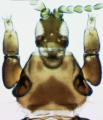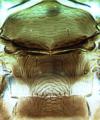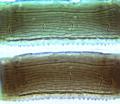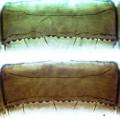Chirothrips manicatus
Recognition data
Distinguishing features
Female fully winged. Body, antennae and legs brown, tarsi paler, fore wings light brown. Head small, prolonged in front of eyes with long preocellar area; 3 pairs of ocellar setae present, pair III anterolateral to fore ocellus. Antennae 8-segmented; segment II asymmetric with prolonged external margin bearing terminal seta-like sensorium; segments III–IV with sensorium simple and stout. Pronotum trapezoidal, 2 pairs of prominent posteroangular setae. Metanotum reticulate, sculpture forming arches around posterior midpoint; median setae not at anterior margin, smaller than lateral pair. Fore wings pointed; first vein distal half with 2 setae, second vein with 4 setae. Abdominal tergites with transverse sculpture lines medially; posteromarginal craspedum with weak lobes; ovipositor weak with faint teeth. Posterior margin of sternites with distinctive tubercles.
Male effectively wingless, wing lobe minute; no ocelli; sternites III–VII with small circular pore plate.
Variation
Females varying considerably in body size, presumably depending on the size of the individual grass floret within which a larva develops.
Related and similar species
Nakahara & Foottit (2012) provide a key to17 species of Chirothrips from North America, and as a result of that work there are now 46 species worldwide listed in this genus. The key to species provided by zur Strassen (1960) treated the genus in a broad sense, whereas Bhatti (1990) created six new genera for these species, including Arorathrips for several species from the New World that have the mesothoracic endofurca reduced.
Taxonomic data
Current valid name
Chirothrips manicatus Haliday
Original name and synonyms
- Thrips (Chirothrips) manicatus Haliday, 1836: 444
- Thrips longipennis Burmeister, 1838: 413
- Chirothrips antennatus Osborn, 1883: 154
- Chirothrips fusca Coesfeld, 1898: 470
- Chirothrips similis Bagnall, 1909: 35
- Chirothrips albicornis Priesner, 1926: 140
- Chirothrips ammophilae Bagnall, 1927: 564
- Chirothrips takahashii Moulton, 1928: 289
- Chirothrips productus Bagnall, 1932: 184
- Chirothrips laingi Bagnall, 1932: 185
- Chirothrips ambulans Bagnall, 1932: 185
- Chirothrips testacea Hukkinen, 1935: 90
- Chirothrips bagnalli Hood, 1938: 162
- Chirothrips longisetis Priesner, 1949: 170
Family placement
Thripidae, Thripinae
Biological data
Life history
Breeding and pupating within individual florets of Poaceae.
Host plants
Various Poaceae species including cereal crops, with no recorded specificity; probably also in the flowers of some Cyperaceae.
Tospoviruses vectored
None
Crop damage
Possibly reducing seed set in crops of Poaceae grown for seed.
Distribution data
Area of origin
Europe
Distribution
Widespread around the world in temperate areas, presumably because each pupa remains within the floret of a grass and these pupae are then distributed in grass seeds.









